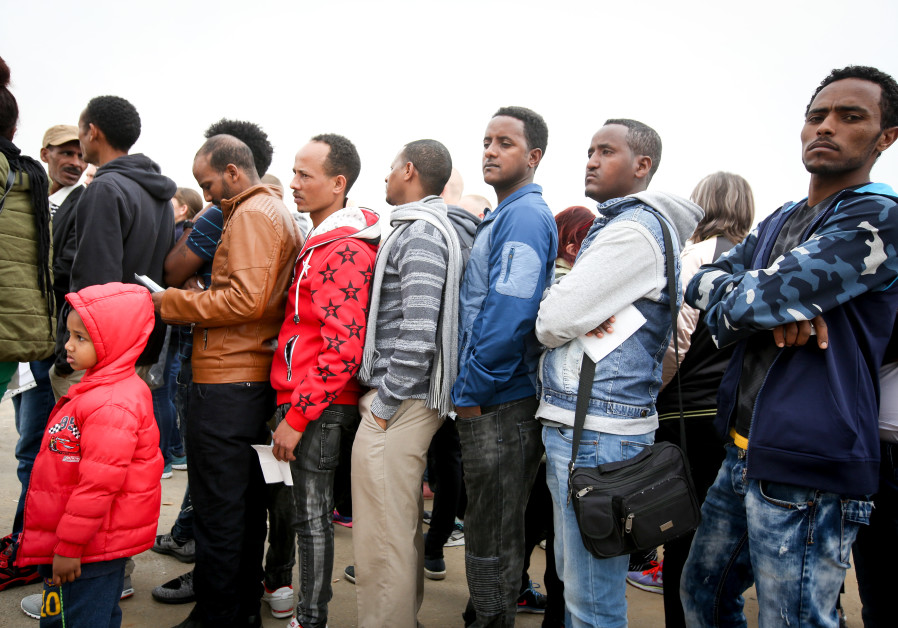Thursday’s ruling may provide a respite for thousands of men who received deportation notices earlier this month.

Thursday’s ruling by a special appeals court that Eritreans who fled forced military service are now eligible for refugee status could prove to be a lifeline for thousands of the 20,000 men slated for deportation to an unknown third African country beginning April 1.
Noting that Eritrean army deserters make up over half of the 28,000 Eritreans presently living in Israel who were previously denied asylum, Ori Lahat, CEO of the African Refugee Development Center, deemed the ruling a “game changer.”
hursday’s ruling by a special appeals court that Eritreans who fled forced military service are now eligible for refugee status could prove to be a lifeline for thousands of the 20,000 men slated for deportation to an unknown third African country beginning April 1.
Noting that Eritrean army deserters make up over half of the 28,000 Eritreans presently living in Israel who were previously denied asylum, Ori Lahat, CEO of the African Refugee Development Center, deemed the ruling a “game changer.”
It remains unclear how many of the remaining 8,500 applicants are Eritreans who fled the military. Currently, there are approximately 38,000 Eritrean and Sudanese migrants living in Israel. The vast majority have been sequestered in ghettos in impoverished south Tel Aviv.
According to Lahat, Thursday’s ruling may provide a respite for thousands of men who received deportation notices earlier this month.
“For the moment, at least, we will try to stop them from being deported because it shows the intent of the government of Israel to send deportation letters even though it knows that their cases should be reopened,” he said.
“The government knew that most countries accepted Eritrean army desertion as a qualification for refugee status, and [Israel] should not have been the one country that was different from all the others. So, I think it shows that Israel’s intent was to deport as many people as possible.”
In Canada, the US and EU nearly 90% of Eritreans qualify for asylum, while in Israel the acceptance rate is a fraction of a percent.
The appeal court’s ruling, Lahat said, warrants cautious optimism.
“This is a serious game changer, and we know there will probably be a next round because the government will appeal the ruling, but for now it is a big win,” he said.
MK Michal Rozin (Meretz) echoed Lahat’s contention that the ruling is evidence of the government’s biased asylum system.
“Today’s ruling is further proof that the asylum-screening system in Israel is failing and biased,” she said. “This is an important decision of the appeals court, which proves the lies of the government. For years, asylum applications for Eritrean refugees have been automatically rejected, unlike other countries in the world that recognize them as refugees.”
Accordingly, Rozin demanded that the expulsion process should be stopped since it contravenes the 1951 Refugee Convention, of which Israel was among the first signatories.
“The deportation process must be stopped immediately,” she said. “The State of Israel must reconsider the requests of Eritrean asylum seekers rejected by it – a decision now ruled by the court, which determined that it was not in accordance with the international standard required by the UN Refugee Convention.”
Meanwhile, Yonatan Jakubowicz of the Israeli Immigration Policy Center, which opposes the absorption of African refugees, said “the majority of evaders from national service in Eritrea are not refugees by the Geneva Convention standards.”
“According to multiple reports and sources, a great portion can return to Eritrea with no fear of reprisal if done so from their own volition, and after paying a 2% tax on their earnings while abroad,” he said on Thursday.
“Among these sources is a recent report by the European Asylum Support Office, an official European Commission think tank, and information from the Israeli Interior Ministry, proving that over 2,000 Eritrean migrants – many of whom are national service evaders – have chosen to return to Eritrea from Israel of their own volition,” he added.
As reported by The Jerusalem Post
